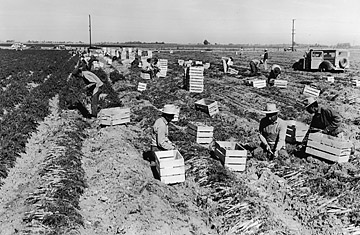
Vincent, Alabama
I'm going to be honest with you. My daddy was a section foreman on the railroad. He had an eye problem and had to retire on the last day of 1929. And in the meantime, he had bought a farm about two miles south of Vincent. And we moved down on the farm. My daddy got a pension, and he had an insurance policy. So my family didn't suffer like a lot of people did. But my daddy was thrifty, I'll say that. Real thrifty.
The farm was 275 acres of land and we had renters on the place. There was five of us boys and two girls and we worked just as hard as everyone else did and we made a pretty good crop. We raised cotton, corn, and just other regular thing. I remember one fella, he had five kids, two of them were really small. He wanted to rent a crop from my daddy. And the fella said, "Now you're going to have to furnish me some money to buy me some groceries." And my dad said, "Well, how much will that take?" And the fella, whose name was Leroy, said "Fifty dollars." He lived on only $50 that year.
We had another family that lived on the farm during that time and the father had to go to the soup line, that's what we called it. And he got flour and lard and powdered milk and powdered eggs for his family to live on. They just didn't have anything. They went to Vincent, about two miles and a half up the railroad track from where we lived, used a horse and wagon to head on up there and get their stuff.
When I was in the ninth grade, when school had a month left to go, the county was going to charge five dollars a head to attend. I had two brothers and two sisters in school. And it just came my time to go to work. I worked one week building a bridge. I carried water for the concrete mixer; five days of work and I could pay for all of us to go to school.
Lesson? My daddy taught me more times than once, Just because you want it, that don't mean you're going to get it or need it. Anything that you need, or got to have, you provide for it.